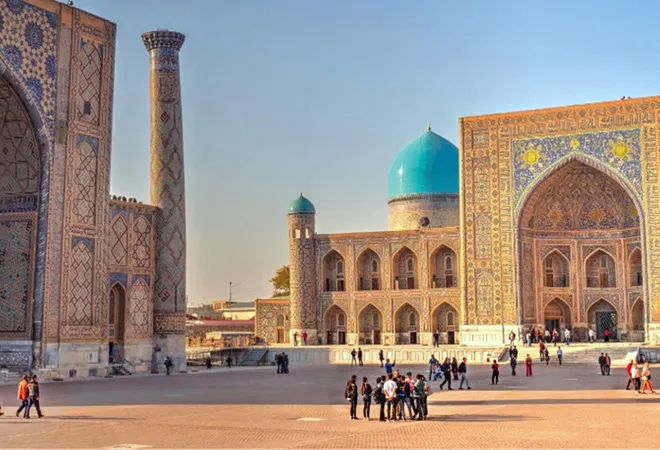
The West has been intensifying sanctions against Russia following the crisis in Ukraine and it would appear that this is likely to continue. These sanctions, although intended as punitive measures against Russia, could entail hefty socio-economic repercussions for the Central Asian Republics (CARs) too, given their economic dependence on Moscow.
The current situation only adds to a series of geopolitical and domestic developments in recent times which have complicated the attainment of economic and political stability in Central Asia. With the West’s abundant willingness to continue sanctioning Russia, coupled with the preceding socio-economic challenges that Central Asia has been facing, it should brace itself for a thorny, difficult-to-navigate road ahead.
The current situation only adds to a series of geopolitical and domestic developments in recent times which have complicated the attainment of economic and political stability in Central Asia.
Central Asia is surrounded by countries that are sanctioned: Iran, Afghanistan, and Russia. However, Russia’s economic predicament affects Central Asia to a much greater degree because Tajikistan, Kyrgyzstan, and Uzbekistan are remittance-dependent economies, largely on remittances from Russia. Following the Crimean crisis and western sanctions against Russia, remittances to the region had reportedly shrunk by 40 percent and Russian border closures due to COVID-19 also resulted in an estimated overall decline of 22 percent in remittances.
Currently as well, remittances from Russia into Central Asian countries account for a large percentage of their GDPs, essentially fueling their economies. Between January and September 2021, 1.6 million Tajiks entered Russia (the highest ever in history), while 3.3 million Uzbeks and 620,000 people from Kyrgyzstan also entered Russia during the same period. The World Bank data indicates that remittances constitute 30 percent, 28 percent, and 12 percent of the GDP of Tajikistan, Kyrgyzstan, and Uzbekistan respectively.
Kazakhstan, albeit not remittance-dependent on Russia, still has major economic stakes in the situation since Russia is a major trading partner for the richest Central Asian country. Russia, which has invested about US $40 billion in Kazakhstan over the last three decades or so might not be able to continue with the same in the foreseeable future, which would have a considerable impact on development projects in the country. The slowing of business investment has already begun, as Owen Schalk writes. The Russian Central Bank’s decision to increase benchmark interest rates from 9.5 percent to 20 percent has put brakes on Russian investment.
Moreover, Kazakhs are being unable to make online transactions as a result of the sanctions affecting Russian banks, and the disconnection of Russian banks from the SWIFT system will curtail Russia’s ability to make payments for Kazakh exports, which could ultimately lead to a decrease in trade between the two.
Kazakhstan, albeit not remittance-dependent on Russia, still has major economic stakes in the situation since Russia is a major trading partner for the richest Central Asian country.
Considering the aforementioned, it would be naïve to assess that Central Asia would be shielded from the current sanctions on Russia. To make matters worse for Kazakhstan, it was just coming off a period of political unrest in January 2022, when the Kazakh people rose against the government. The protests were triggered by the rising fuel prices, but in the larger context, the people demanded a greater standard of living and for the country’s ex-President Nursultan Nazarbayev to give up his remaining political influence even though he gave up the Presidency in 2019. Thus, after this countrywide political instability and clashes between the people and the government that reportedly claimed 150 lives, Kazakhstan was trying to establish political and economic stability when sanctions have been imposed on Russia.
The Taliban equation
To be sure, the Kazakh political unrest in January and the expected challenges that sanctions on Russia might bring about for Central Asia, were preceded by the Taliban takeover of Afghanistan that was likely to have serious security and economic ramifications on the CARs.
The Taliban’s coming to power in Afghanistan has already raised concerns of rising Islamic fundamentalism in the country, which could possibly spillover to the CARs as Tajikistan, Turkmenistan, and Uzbekistan share a 2,387-kilometre-long border with Afghanistan. The security concerns in the CARs are compounded by the presence of terrorist outfits like Islamic Movement of Uzbekistan (IMU), Islamic Jihad Union (IJU), Jamaat Ansarullah as well as radical Central Asian ISIS fighters who have been reported to have joined the ranks of different terror groups in Afghanistan.
Furthermore, the situation in Afghanistan is counterproductive to Central Asian economic interests from the point of view of getting connected with India’s large market. India’s import-dependent energy requirements could be viably catered to by the abundance of Central Asia’s energy resources, but connectivity projects like the Turkmenistan-Afghanistan-Pakistan-India (TAPI) pipeline that has been in the making for decades has ceased to come to fruition because of geopolitical complications. Barring the TAPI, the accentuated instability in a Taliban-ruled Afghanistan and the Central Asian region, will make it even more difficult for any connectivity projects pertaining to Central Asia to proceed at an acceptable pace, something that has anyway not been happening over the years due to a variety of geopolitical reasons.
The situation in Afghanistan is counterproductive to Central Asian economic interests from the point of view of getting connected with India’s large market.
Prolonged period of economic crisis in the CARs could act as a catalyst for political unrest in the region. Instability in Central Asia combined with the presence of extremist outfits both within Central Asia and in the vicinity in Afghanistan would act as a breeding ground for enhanced security challenges through rising fundamentalism.
The need to look beyond Russia
The Central Asian countries would now have to look harder to diversify their economic linkages to reduce dependence on Russia. China has been a major economic actor in the region over the past few decades with trade numbers amounting to US$100 billion. The possible economic ordeal that Central Asia might face in the near future gives China an added opportunity to work on the foundation that it has already been laid in Central Asia and solidify its position further in this strategically important region.
This would, of course, be bad news for India since it has been trying to improve its linkages with Central Asia through regular diplomatic engagements ever since the Taliban came to power in Afghanistan. The connectivity barrier had already been hampering India-Central Asia relations from reaching its full potential, but if China gains even more influence in Central Asia as a result of the situation, it would become even tougher for India to make inroads.
The possible economic ordeal that Central Asia might face in the near future gives China an added opportunity to work on the foundation that it has already been laid in Central Asia and solidify its position further in this strategically important region.
The governments in Central Asia have a lot to think about and navigate at the moment; a long period of possible economic distress resulting from sanctions on Russia which enhances the likelihood of political unrest in Central Asia due to the people’s unhappiness and this domestic instability acting as a hotbed for fundamentalism that already exists within Central Asia, paired with the prospects of fundamentalists’ spillovers from Afghanistan.
While dealing with these challenges, the CARs also must simultaneously devise strategies to reduce their economic dependence on Russia as it is unknown how badly the sanctions will affect Russia in the long run. The CARs either must become economically self-sufficient which is difficult in the short run, or diversify economic relationships which would also be tricky, because the persisting instability in the region could dissuade other countries from looking towards Central Asia. It remains to be seen exactly how badly this situation hits Central Asia in the long run, but the road ahead towards socio-economic stability is sure to be extremely rocky.
The views expressed above belong to the author(s). ORF research and analyses now available on Telegram! Click here to access our curated content — blogs, longforms and interviews.




 PREV
PREV


